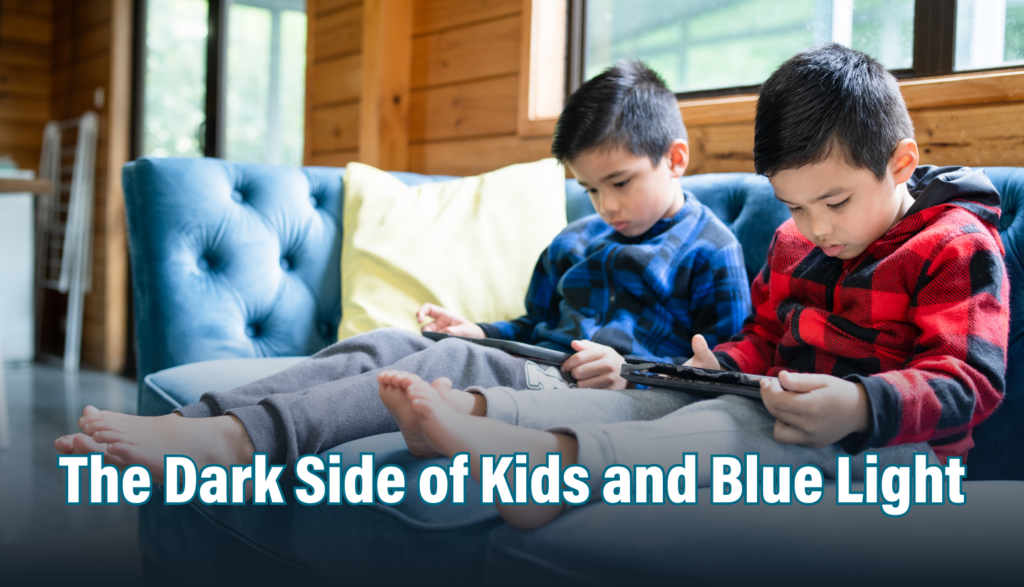The pieces of the blue light puzzle are starting to come together, and things are looking darker.
We’ve said in the past that, ever since our COVID lockdown days, kids’ screen use has gone through the roof. Using phones, tablets and other screens at night suppresses the body’s production of the sleep hormone melatonin, because of the blue light those devices produce.
When we see a brightly shining screen, our brains think “sunlight,” and then they shut off the melatonin spigot, so to speak. Less melatonin tends to mess up our circadian rhythm—our sleep/wake cycle, in other words.
That’s true for anybody at any age. But for teenagers in particular, that resulting lack of sleep can manifest itself in the form of academic struggles and increased emotional troubles.
In conjunction with that, a Harvard study stated that those circadian rhythm interruptions can also dysregulate our insulin production and effect our sugar levels, impacting kid’s ability to feel sated and leaving them at an increased risk of obesity.
Given all that, it would make perfect sense for teens to cut back on the late-night screen use and strike up some prepare-your-body-for-sleep routines.
On top of all that, however, there have been studies over the last couple of years—a 2022 study presented at the Annual European Society for Paediatric Endocrinology Meeting and a 2023 joint study from Gazi University and Bilkent City Hospital in Ankara, Turkey—that strongly suggest that there’s even more going on. And for younger kids, too. These studies seem to show a link between kids’ overexposure to blue light and the early onset of puberty.
How does that work? Well, it turns out that kids’ melatonin does more than impact their sleep patterns. It regulates the sex hormones their bodies produce and, in a way, delays the onset of puberty. Mess with that melatonin, and you mess with how fast these kids grow up. The average age for puberty has been estimated to be around 11 to 13 for girls and a bit later for boys. But the studies suggest that that blue light overexposure could bring on puberty “significantly earlier.”
Is that a big deal? I mean, many parents might want their kids to be a little more mature, right? But we’re not talking about emotional maturity: We’re talking sexual maturity. You know, the release of higher levels of reproductive hormones and changes in the physical makeup of reproductive organs. And that can, frankly, lead to some possible negative health consequences, doctors say.
It can lead to such things as abnormal menstrual cycles and decreased fertility. In fact, studies have shown that some 12 hours exposure to blue light can cause inflammation in our body cells and diminish the function of our mitochondria, so the body has less energy to do the things it needs to do.
Now, you might be thinking, OK, Plugged In guy, doesn’t the sun produce blue light? And the answer is, yes. But those devices we use produce artificial blue light. And those close-to-our-nose screens hit us with something like four times the intensity of blue light we get from the sun. And sunlight does a number of really good things for us, helping our eyes produce dopamine, serotonin, and melatonin.
Oh, and if you’re thinking about running out to get everybody those expensive blue light-blocking glasses, well, you might want to save your money. It turns out those glasses only block about 10 to 25 percent of the light, so it doesn’t significantly impact your exposure. They might help your eyes feel less fatigued after a long day in front of a computer screen, but they really won’t help your brain out.
So, what’s the solution? Well, knowledge is the first step. If you and your kids are aware of the problems and the potential dark side of all that bright, late-night light, then you can talk about the best choices. Maybe you change up routines. Experts say that using red light or reading by incandescent lightbulbs at night is better for body and mind.
Whatever you choose, it’s behavior that makes the biggest difference for kids and adults. And the right choices help the body’s natural processes work as they should.







2 Responses
Screen time is good in moderation.
Maybe they will invent screens that use other types of lights?